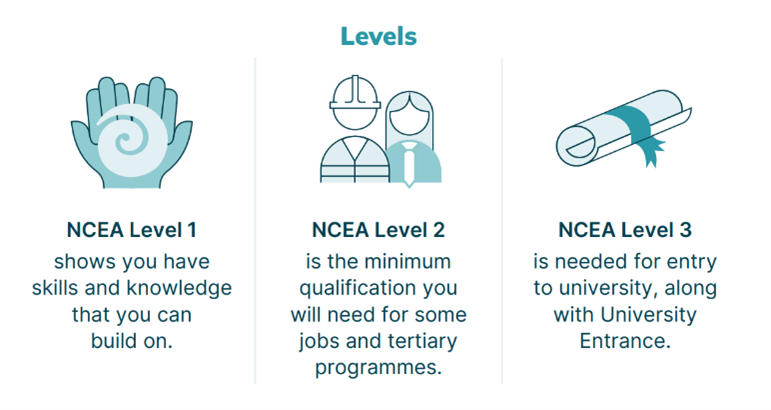
You are logged in as
Logout
You are logged in as
Logout
Dear Parents and Caregivers
We’re now at the ‘sharp end’ of the academic year, starting with our upcoming Prelim examinations and continuing on to the NCEA and NZ Scholarship examinations in November. Prelims have a priority in the academic life of the College for a number of very important reasons that I’ll elaborate on in this newsletter.
The purpose of this newsletter is, along with talking about several other things, to talk particularly about how this year’s Prelims, and the derived grades that they provide for external standards, are very important for our students.
At all times, please feel free to contact me via email with any questions that you may have about NCEA, or matters raised in this newsletter at DBV@stac.school.nz.
Kind regards
David Bevin
Head of Teaching and Learning – Secondary

In recent months, the ‘national discussion’ about this has continued and, as you may know, was referred to in the government’s recent announcement of the proposal to replace NCEA with a new qualifications pathway (you can refer to the article by clicking here. Our Principal of the Secondary School, Evert van Florenstein, discussed this issue with Year 13 students in a presentation several weeks ago. I would like to add my thinking to this discussion and would ask you to engage your child in a discussion about this with these thoughts in mind:
For my part, I strongly encourage all students to attend, and make their best effort in, every external examination this year and your support in reinforcing this message at home is greatly appreciated.
Over Weeks 7–8, year group meetings are taking place where the expectations of students in the upcoming Prelim examinations are outlined. I am hopeful that they have a clear understanding of the issues and that they particularly understand why derived grades hold a great deal of importance for them.
Students must prepare as well as they can for the Prelims and aim to do their best. This will then enable them to ‘bank’ secure derived grades that are as good as they can get and that they may possibly need to use, should they be needed, for NCEA examinations. Every year, we have a good number of students who make applications for derived grades for their NCEA externals, and no-one can be absolutely sure that there won’t be a disruption to their preparation for the examinations and/or in the exam period itself.

Students at all levels are currently working towards completion of their internal assessment programmes by the end of the term. Some courses have already completed their assessment programmes, while others will be just a few weeks away from completion. Teachers are working towards the Thursday 18 September deadline for the completion of most internal assessment programmes and any delays in the completion must have been discussed with me. In one or two subject areas, (e.g., Years 12 and 13 Physical Education for NCEA) assessment programmes are solely internal assessment-based and, as such, students in those subjects may continue to be assessed into Term 4. In the majority of subjects, though, when students sit their Prelims, they will have completed their internals and will be able to focus solely on preparing for the external standards.
In some subjects, such as Visual Arts, the external assessment is not an examination but, rather, a portfolio of work that is produced in school and then subjected to external marking and/or a marking verification process. These portfolios are usually a fairly extensive body of work produced over time and have a credit value of at least 12, if not a bit more than that. As these are external assessments, the final result for the portfolio is not confirmed until all results are provided in January of next year. The Art teachers set deadlines in October/November for completion of the portfolios, and it is extremely important that students meet the deadline. Those dates are set by NZQA and, just like an examination, there is no possibility of an extension or a late submission; students must meet the deadline for completion that is given by their teacher. A situation of sickness affecting completion is managed through the NZQA derived grade process.
Possibly a very big ‘player’ at an individual student level in the 2025 NCEA year and, so, in our upcoming Prelims.
That is why you are asked to talk with your child about their preparation for the Prelims and about their performance, it is very possible that they will be their most important external assessments this year.
Right now, many Year 13 students (for Year 12 students, that’s in 12 months’ time) are busy preparing their CVs and making applications for tertiary Scholarships and Halls of Residence. Each application requires a student to provide their last set of completed NCEA results, namely, their NCEA Level 2 results.
It’s a very competitive world and each Scholarship and Hall of Residence application is part of a contestable process. Without labouring this point, if a student made a successful derived grade application for their Level 2 examinations, with the grades coming from school examinations for which they did not prepare particularly well, the application will potentially look less ‘compelling’ - another reason for preparing well and trying to do one’s best in the school Prelim examinations.
1. Important teacher feedback
Results provide feedback to students, teachers and parents. The results in each Standard’s examination provide a clear indication of just how well students are prepared for the requirements of the external Standards for which they are entered this year. Have they reached (or not) the required level of achievement already – and to what extent? What are their next steps?
This year, many/most students will have targets related to the gain of NCEA Certificate and Course endorsements, and their results will show how they are tracking towards those targets.
2. Results for confirming a student’s eligibility for 2026 course entry
As part of the decisions about 2026 course selections and entry, Heads of Department will check the Prelim examination results when considering a student’s eligibility for entry to courses next year. Students have been reminded that course entry is not open entry in many cases, and the examination results provide teachers with a good view of a student’s ability to meet the demands of next year’s course. As students move ever closer to their chosen tertiary course of study, the results that they gain in the school exams are potentially much more significant than thought – are they doing/have they done well enough to meet the next year’s course entry requirements? Will they get into that, or those, courses that they are considering?
3. A student’s eligibility for Subject Prizes and other end of year academic awards
At the end-of-year College Prizegiving, top academic achievement is acknowledged in the form of subject prizes and other awards are made to students based on their results during the year particularly, where the external Standards are concerned, from the Prelim examination results. As such, a student should appreciate the significance of their performance in the exams if they are targeting such academic awards.
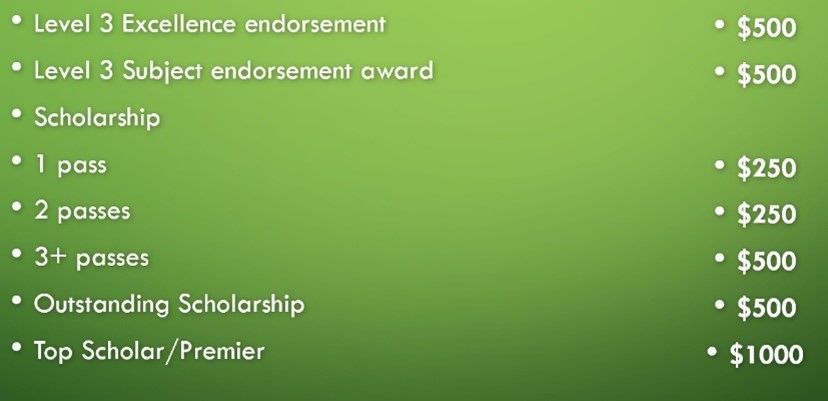
It’s appropriate to mention the academic awards that are made each year in February for students’ performance in the NCEA and Scholarship examinations. In my talks with students this week, I have reminded them of these as, again, their Prelim exam results could become our ‘reference points’ when working out those awards, depending on whether we manage to successfully run the external programme of NCEA and Scholarship examinations.
These awards are mostly for our Year 13 leavers, although can be gained by Year 12 students who study courses either fully at a higher level or in part. The NCEA thresholds must be met by those students too to qualify for these awards.
Year 12 students will be awarded with one or more of the awards of Academic 30s, Colour, Tie, Blazer and NCEA Certificate Excellence endorsement although some may also qualify for the Level 3 Excellence and/or subject endorsement awards and New Zealand Scholarship.
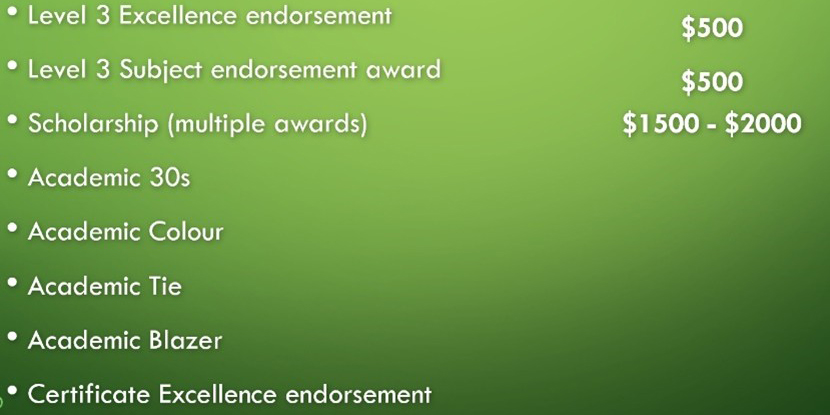
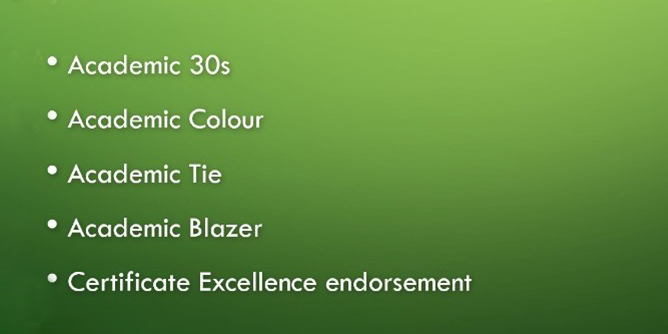
Year 11 students will be awarded with one or more of the Academic 30s, Colour, Tie, Blazer and NCEA Certificate Excellence endorsement although some may also qualify for the Level 2 Excellence and/or subject endorsement awards and New Zealand Scholarship.
Firstly, a reminder about the information that we provide regarding the Prelim and NCEA examinations that is accessible through StACNet, NCEA. Take a look through the FAQs for all of the details on the running of the Prelims, issues such as lateness, absence, sickness.
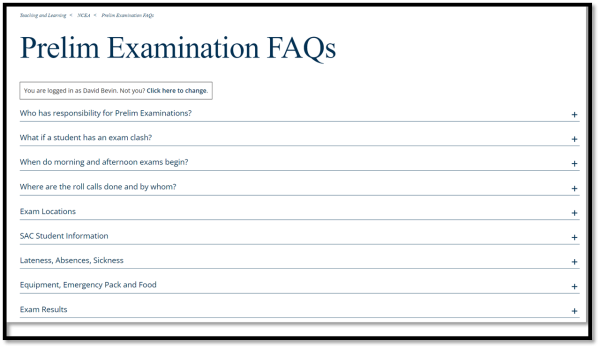

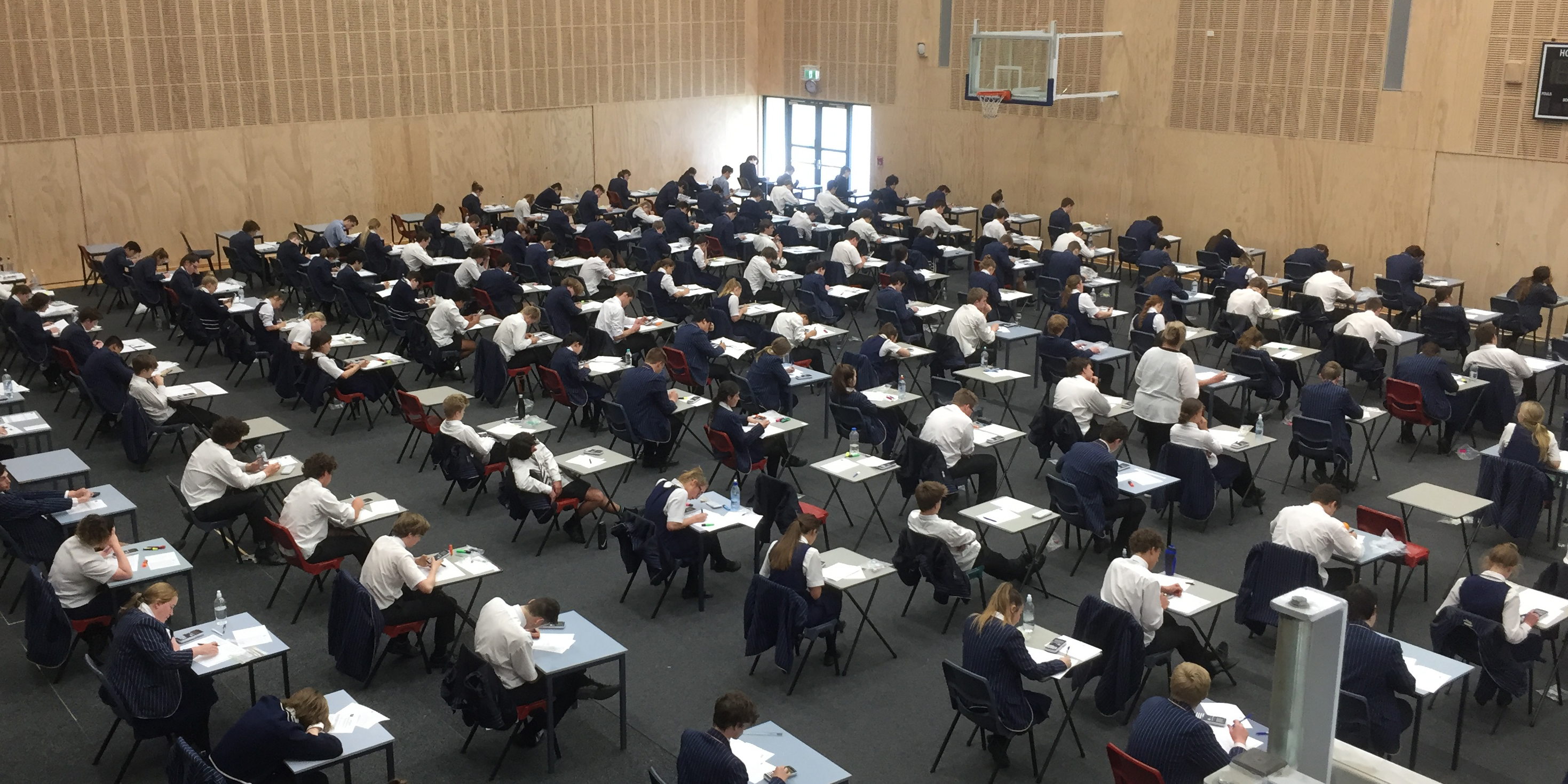
Please note the following information – absence from examinations is not usually a big problem at all at St Andrew's College but this is how we manage it if it happens.
We expect 100% attendance from all students.
All students must sit all of their examinations and the Deans, Heads of School and I will be very watchful about this during examination time. A case of non-attendance is very problematic and must be avoided where possible.
As per my previous comments, absence from an examination means no grade is available for a derived grade for (a) standard/s not sat.
Prelims will run from the morning of Wednesday 3 September to the end of Friday 12 September.
During the examinations, students will not be required at school other than for their examinations. Any student who has an examination must sit it – not doing so is not an option (never forgetting the derived grade!).
Students sitting subjects with external assessments that are assessed but not as examinations may have workshops that they are required to attend during the programme.
Due to the nature of setting an examination timetable, some students will complete their examinations earlier than Friday 12 September, however, many students may still have internal assessments to complete, so they should use any ‘spare’ time to work on completing internals.
These examinations include practice examinations in Scholarship subjects.
Last Friday, all students received an email from the Timetable mailbox with their confirmed personalised examination timetable. They are now very clear about when their examinations are on and where. This is what the email informed students about.
In this email, you are receiving the FINAL version of your exam timetable for the upcoming NCEA and Prelim exams that run during Weeks 8 and 9 of this term – 3 to 12 September. This version also shows your exam rooms.
For most students, this timetable version is the same as the one you received last week but be sure to check it again as there have been changes for a small number of students. Your exam timetable is set, and all students must attend their exams as indicated.
All students who have Special Assessment Conditions, such as a Reader/Writer, will be told by Mrs Broad of the rooming arrangements before each exam and must meet her before each session in or outside AB101. This includes students who use a computer for their exams.
It is very important that you are aware of when your exams are on and of the rules and expectations that the College has for you. Be aware in particular of the exam times:
- Morning sessions run from 9am to 1200
- Afternoon sessions run from 1.30pm to 4.30pm
You are required to line up for the exam roll call with the Dean 45 minutes before each exam is scheduled to begin.
Please remember that your Prelim exam grades provide the ‘standard’ derived grade that will be explained to you in exam briefings next week. Therefore, please prepare very well for the Prelims and aim to do your very best!
A reminder about absence; don’t call the College on the absence line, rather, contact the Middle School Reception (for Year 11) or Senior College (for Years 12 & 13) promptly at the start of the day. All medically related absences require students to provide a medical certificate to Mr Bevin within 24 hours of the examination that is missed.
A final reminder about device readiness – you should know by now which exams you are sitting online (this includes NCEA Common Assessment Activities) and that your device must be in very good working condition and able to last for the full length of a 3-hour exam. Be sure to charge it up the night before each digital exam and remember to bring it with you on the day, including to your roll call with the Dean. The school will only lend you a device if you have a proven major problem with yours.
NZQA Login – you will need to remember your details (username and password – known only to you, not to the school) so that you can use them to access an NCEA Common Assessment Activity.
Exam.net – if you are sitting a digital Prelim, you are most likely to be sitting it on exam.net. Make sure you are familiar with how to sit an exam on this platform.
This week, students are receiving from their Tutor their Prelim Exams Information booklet which outlines all the rules and procedures that are used to ensure that the Prelims run smoothly.
It is very important that students inform themselves fully about what is happening, when and where so, for your part, please ask them just what is happening during the examination week!
Examination clashes
The shorter duration of our examinations means that we have to run multiple examinations in a session, meaning some students have two examinations on at the same time, called an examination clash. To manage such clashes, some students are required to sit one of their examinations at a time other than the set one. It does mean that those students will sit an examination after it has already been sat and we rely on students not to tell ‘clash’ students about the exam! Students with such clashes have those marked on their personalised timetable.
Special Assessment Conditions (SACs)
A number of students have had their entitlement to Special Assessment Conditions approved by NZQA. The process of application and approval was very detailed and lengthy and the time for applications has now closed. Students must use their SAC in all Prelim examinations, and it is important that they have both confirmed their entitlement with Mrs Broad and that they understand the expectations of them. They must understand that the use of SAC is very formal and must be taken seriously in all examinations.

One of the golden rules of NCEA (and of our College Prelim examinations) is about student use of cell phones… the rule is very simple…. they are not to be used by students at any stage during an examination – this includes if a student makes a toilet visit.
If a student is caught using, or having in their possession, a cell phone they will be guilty of misconduct of the most serious kind – and the penalties for this are very serious. Sadly, in recent years, I have had to deal with this situation in examinations and the students concerned were censured in a very significant way; this included losing the results for their examination amongst other things. This rule, and the associated penalties, are made very clear to students every year and will be outlined in the student Examination Booklet. If anyone takes a different view about this particular rule, they need to be very clear about what NZQA (and we!) expect. It’s serious!
The widespread use of smart watches means that NZQA has mandated that no watches may be worn in examinations. It’s not surprising but schools are expected to enforce this rule in their school examinations and Examination Centre Managers are required to enforce it in the NCEA examinations. Clocks will therefore be provided in all examination rooms and a very large digital timer will be provided for the Gym. Students who have Special Assessment Conditions Assistants will be able to ask those people for the time throughout the examination.


Students in a number of subjects are completing their Prelim examination/s online in preparation for doing their NCEA examination in that way in November.
Students will sit their Prelim examination/s using their own laptop and will complete the paper/s online using the exam.net app and platform.
The results students gain in their online examination will provide valid derived grades for the NCEA examination.
Device Readiness (all students)
It’s important to talk about the importance of device readiness given the large number of digital examinations that we run for both our Prelims and NCEA. All students who are sitting digital assessments will do so using their own device. It is essential that the device is in good working order and able to last for a minimum of three hours for an examination or assessment; students are responsible for the condition of their device and should be talking to the school if there are any problems. The College has a policy for examinations and assessments of making a school device available only in exceptional circumstances. All inquiries about the information above should be emailed to Mr Bevin (DBV@stac.school.nz)
This is the second time this year for assessment of the NCEA Literacy/Numeracy requirement (the first time being in May) and, because there are three separate Literacy/Numeracy standards with individual assessments, the programme will happen on three separate days, those being Monday 1 September (Writing), Thursday 4 September (Numeracy then Reading). Students in Year 11 who are having another attempt at one or more of the standards or who missed one or more of the May assessments have been timetabled to sit the relevant assessment and that is showing on their personalised timetable. Students sitting an NCEA assessment will need to use their NZQA login for their assessment/s so must be sure that they still remember the details and know how to use the NZQA website to access the assessment.
Just to repeat some relevant key information. Students must gain the 20-credit co-requisite (Writing – 5 credits, Reading – 5 credits, Numeracy – 10 credits) to be able to gain an NCEA certificate and that is why gaining these 3 standards is very important.
| Friday 22 August |
Students receive their final personalised examination timetable |
|
By Friday 29 August |
Students receive from their tutor their Prelim Examinations Booklet |
|
Wednesday 3 September |
Prelim examinations commence (morning and afternoon examinations) |
|
Friday 12 September |
Prelim examinations conclude |
|
Monday 15 – Wednesday 17 September |
Students receive back examination results and teacher feedback |
|
Thursday 18 – Friday 19 September |
Academic Conferences – Tutor-Student-Parent (face-to-face meetings) |
Students are not required to attend classes at school during the Prelims. This allows them to study for examinations (some students have quite a large number of Prelims, particularly those sitting Scholarship Prelims as well as their NCEA level examinations – preparation time is essential) and teachers to mark, check mark, discuss marking outcomes with their colleagues and analyse and prepare feedback on each student’s performance. This is done ‘at speed’ so that we are able to give each student detailed feedback before the Term 3 holidays on their performance in the Prelims that also provides feed forward for their preparation for the big NCEA examinations. This feedback is discussed and given through a student’s tutor at formally scheduled Academic Conferences at the end of this term. This is not only about a tutor giving feedback but also about the student discussing with them and their parents how they performed in the Prelims and working out what their next steps in preparation are.
The Conferences take the place of end-of-year Parent-Teacher interviews and are run by the tutor and student, in conversation with the student’s parents. They are very much about a review of the Prelim examination results and discussion of the student’s next steps in preparation for the NCEA examinations in November. Information about this event has already been provided separately by me and Assistant Head of Secondary School (Academic), Helaina Coote, to students, staff and parents to help them to understand what is expected in an effective educational conversation such as this.
Following is a reminder about the student’s NCEA Current Results Summary. It’s increasingly up to date and always accessible through your own login to the College Portal. It will tell you much about how your child is progressing and will support any inquiry that you might want to make to an individual teacher.
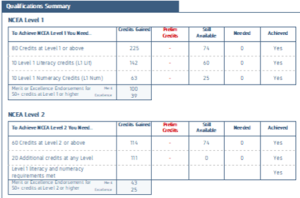
Using your own access to the Community Portal/Results tab, you can access your child’s NCEA results to date, including the Prelims. In Term 3, the data changes regularly as more and more assessments and assessment programmes are completed.
It shows both final results for internals, perhaps some ‘indicative’ results data for external standards and then the Prelim results at the end of this term (remember, they become in most cases the derived grade for NCEA). The Summary also provides tables showing a student's progress towards the various NCEA awards as outlined above.
It’s quite difficult for busy parents to follow all of this NCEA data but we have worked hard to present it in such a way as to show accurately where a student stands in relation to the various NCEA awards and perhaps any goals for achievement that they have set for themselves. The document and its data enable parents to do a Term 3 holidays progress check in relation to those awards and goals and, even with a student who tends to have this ‘all in hand’, a good conversation can’t do any harm. Of course, for those students who tend not to worry too much about goals etc, the conversation can be very helpful and can help with the setting of targets for the NCEA examinations in Term 4. I do encourage you to set up some time for such a conversation with your student and to keep checking in on their results over the rest of the year.
NCEA and Scholarship exams begin for Years 12 and 13 students on Tuesday 4 November and Monday 10 November for Year 11 students. Information regarding leaving dates for these year levels has been provided in previous communications from the College. Please also note that we do not provide a coordinated programme of exam tutorials for NCEA-level students once they go on study leave although individual teachers may do so where that is possible.
For your convenience, these are some helpful links to click on for more information.
The NZQA website is a treasure trove of resources to do with NCEA and other national qualifications. The student Learner Login is located on the website and is the ‘portal’ through which students access their official assessment results and qualifications records. The website is where students access online examinations and Common Assessment Activities in particular. Other things such as previous years’ assessments are available along with many other assessment resources. It is built to be used by all of our ‘stakeholders’ i.e. teachers, students, parents.
NZQA Website>